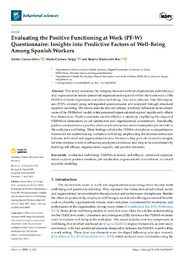Please use this identifier to cite or link to this item:
https://hdl.handle.net/11000/38376Full metadata record
| DC Field | Value | Language |
|---|---|---|
| dc.contributor.author | García Selva, Adrián | - |
| dc.contributor.author | Neipp López, María del Carmen | - |
| dc.contributor.author | Martín del Río, Beatriz | - |
| dc.contributor.other | Departamentos de la UMH::Ciencias del Comportamiento y salud | es_ES |
| dc.date.accessioned | 2025-11-21T11:07:40Z | - |
| dc.date.available | 2025-11-21T11:07:40Z | - |
| dc.date.created | 2025 | - |
| dc.identifier.citation | Behavioral Sciences | es_ES |
| dc.identifier.issn | 2076-328X | - |
| dc.identifier.uri | https://hdl.handle.net/11000/38376 | - |
| dc.description.abstract | This study examines the interplay between individual predictors (self-efficacy) and organizational factors (perceived organizational support) within the framework of the PERMA+4 model to promote workplace well-being. Data were collected from 545 employees (57.8% women) using self-reported questionnaires and analyzed through structural equation modeling. The results indicate that self-efficacy positively influences seven dimensions of the PERMA+4 model, while perceived organizational support significantly affects five dimensions. Positive emotions are identified as a mediator, amplifying the impact of PERMA+4 dimensions on job satisfaction and organizational commitment. Specifically, positive emotions have a positive effect on job satisfaction, underscoring their pivotal role in the workplace well-being. These findings validate the PERMA+4 model as a comprehensive framework for understanding workplace well-being, emphasizing the dynamic interaction between individual and organizational factors. Moreover, they provide actionable insights for interventions aimed at enhancing employee satisfaction and long-term commitment by fostering self-efficacy, organizational support, and positive emotions. | es_ES |
| dc.format | application/pdf | es_ES |
| dc.format.extent | 22 | es_ES |
| dc.language.iso | eng | es_ES |
| dc.publisher | MDPI | es_ES |
| dc.relation.ispartofseries | Vol. 15 | es_ES |
| dc.relation.ispartofseries | nº 4 | es_ES |
| dc.rights | info:eu-repo/semantics/openAccess | es_ES |
| dc.rights | Attribution-NonCommercial-NoDerivatives 4.0 Internacional | * |
| dc.rights.uri | http://creativecommons.org/licenses/by-nc-nd/4.0/ | * |
| dc.subject | workplace well-being | es_ES |
| dc.subject | PERMA+4 model | es_ES |
| dc.subject | self-efficacy | es_ES |
| dc.subject | perceived organizational support | es_ES |
| dc.subject | positive emotions | es_ES |
| dc.subject | job satisfaction | es_ES |
| dc.subject | organizational commitment | es_ES |
| dc.subject | structural equation modeling | es_ES |
| dc.subject.other | CDU::1 - Filosofía y psicología::159.9 - Psicología | es_ES |
| dc.title | Evaluating the Positive Functioning at Work (PF-W) Questionnaire: Insights into Predictive Factors of Well-Being Among Spanish Workers | es_ES |
| dc.type | info:eu-repo/semantics/article | es_ES |
| dc.relation.publisherversion | https://doi.org/10.3390/bs15040455 | es_ES |

View/Open:
Behavioral Sciences, 15(4), 455.pdf
1,02 MB
Adobe PDF
Share:
.png)
